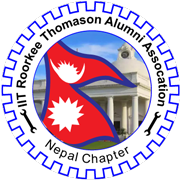IIT Roorkee Alumni Association Nepal (IITRAAN) is proposing to setup a Technical Advisory Services for Development Projects in various disciplines under the IITRAAN Outreach Programme (IITRAAN OrP).
Objective: The main objective of the Technical Advisory Services is to contribute to community, nation, alumni and professional societies as a National Think Tank and Professional Resource Pool for advisory services in critical areas of Nepal’s development.
Initial Thematic Areas of the Advisory Service: The Technical Advisory services will be initially undertaken in the following key areas and sectors:
- Water Resources Development Advisory: the advisory services will be carried out with collaborative interactions with Ministry of Energy, Water Resources and Irrigation (MoEWRI), Water and Energy Commission Secretariat (WECS), Department of Water Resources and Irrigation (DoWRI), Department of Electricity Development (DOED), Nepal Electricity Authority (NEA), Investment Board of Nepal (IBN), Society of Consulting Architectural and Engineering Firms (SCAEF), Federation of Contractors Association of Nepal (FCAN), and Provincial and Local Governments.
- Water Supply and Sanitation Development Advisory: the advisory services will be carried out with collaborative interactions with Ministry of Water Supply (MoWS), Department of Drinking Water Supply and Sanitation (DWSS),High Powered Bagmati Civilization Integrated Development Commission (HPBCIDC), Society of Public Health Engineers Nepal (SOPHEN), SCAEF, FCAN, and Provincial and Local Governments.
- Transport Development Advisory: the advisory services will be carried out with collaborative interactions with Ministry of Physical Infrastructure and Transport (MOPIT), Ministry of Federal Affairs and Local Development (MOFALD), Department of Roads (DOR), Road Board of Nepal (RBN), Society of Transport Engineers of Nepal (SOTEN), SCAEF, FCAN, and Provincial and Local Governments.
- Urban and Rural Development Advisory: the advisory services will be carried out with collaborative interactions with Ministry of Urban Development (MOUD), MOFALD, Department of Local Infrastructure Development and Agricultural Roads (DOLIDAR), Department of Urban Development and Building Construction (DUDBC), Society of Nepalese Architects (SONA), Regional and Urban Planners Society of Nepal (RUPSON), SCAEF, FCAN, and Provincial and Local Governments.
- Research and Development (R & D) Advisory: the advisory services will be carried out with collaborative interactions with Ministry of Home (MOH), National Disaster Risk Reduction and Management Authority (NDRRMA), Tribhuvan University (TU), Kathmandu University (KU), National Academy of Science and Technology (NAST), National Agricultural Research Center (NARC), Institute of Engineering (IOE) and other research institutions.
Guideline to implement the Technical Advisory Services
The following guiding approach will be followed in the Technical Advisory Services:
- Prioritization of the proposed activities to achieve the advisory services shall be carried out using a set of agreed criteria, focusing on “low hanging” opportunities in the beginning and gradually expanding the activities.
- Three to five specific activities will be selected in the first year, and other activities will be planned and carried out in the following years after evaluating the impact and progress of the first year.
- The scope of activities shall be focused on and be limited to “Advisory Role” only, and will NOT include consulting or advocacy activities as these do not normally fall on the domain of Alumni associations like IITRAAN.
- Thefindings and recommendations of the advisory services shall be based on the scientific analysis supported by sound evidence and data. The analysis and reports prepared will be transparentand open access, unless otherwise agreed with the recipient organizations.
- Peer review and Quality Assurance/Control procedures will be followed in all publications, recommendations and outputs.
Contributing experts shall demonstrate the highest level of professional and personal integrity and ethics in the advisory activities, and shall be transparent and declare any possible conflict of interest.

